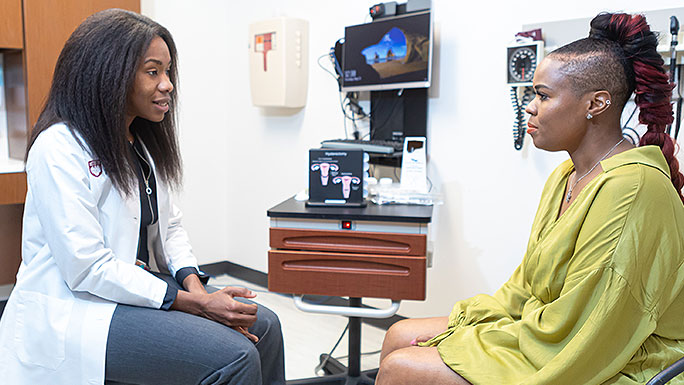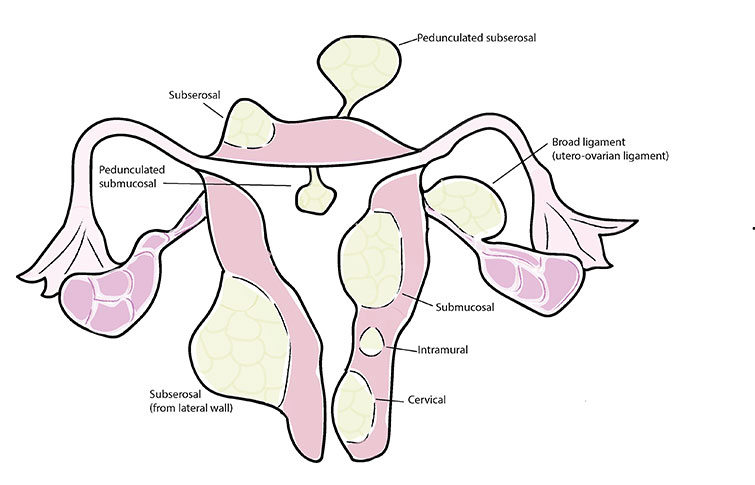Uterine Fibroid Treatment Options

Fibroids are treatable.
Our experts will support you in choosing the best treatment option for you.
What are fibroids?
Uterine fibroids are benign (noncancerous) growths in the muscle walls of the uterus. Also called leiomyoma or myoma, fibroids can be as small as an apple seed or as big as a grapefruit — sometimes even bigger. Fibroids may occur individually or as a cluster. They often increase in size and frequency with age, but may shrink slightly after menopause.
At the Center for the Advanced Treatment and Research (CATeR) of Uterine Fibroids, we create personalized care and treatment plans designed to:
- Remove fibroids
- Shrink fibroids
- Manage and treat fibroid symptoms
Whether your symptoms are mild and manageable or you’re in urgent need of relief, our experts at the CATeR Fibroid Center are ready to help.
About Uterine Fibroids
Fibroids symptoms can vary significantly from person to person. Some women experience severe symptoms, while others have no symptoms at all. Oftentimes, women who do not have symptoms at first may begin to experience symptoms as the fibroid grows.
Common symptoms of fibroids include:
- Abdominal distension or bloating
- Anemia (low count of healthy red blood cells)
- Heavy bleeding, cramping or clotting during periods
- Infertility or difficulty getting pregnant
- Pain during sexual intercourse
- Pain or pressure in the abdomen or lower back
- Prolonged periods (consistently more than seven to eight days)
- Urinary problems, such as the need to urinate frequently, and rarely, leakage or inability to empty the bladder
- Vaginal bleeding between periods

Fibroids are classified based on how and where they grow:
- Intramural fibroids are embedded within the uterine wall. Symptoms include pelvic pressure, frequent urination, heavy bleeding, prolonged periods and cramping or clotting during periods.
- Pedunculated fibroids branch out from the interior (pedunculated submucosal) or exterior (pedunculated subserosal) surface of the uterine wall. Protruding out on a stem of tissue, these fibroids can shift and even twist, causing pelvic pain and pressure.
- Submucosal fibroids grow on the interior surface of the uterine wall, just beneath the inner lining of the uterus (endometrium). They are commonly associated with heavy bleeding. This type of fibroid is generally the least likely to occur.
- Subserosal fibroids grow on the exterior surface of the uterine wall, often causing pelvic pain and pressure.
A treatment option that works for a friend, sister or mother may not work for your unique situation. It is important to take a holistic account of what your lifestyle goals are, so that we may partner with you to achieve them.
In addition to your symptoms, age and the number, size and location of your fibroid tumor(s), there are many things to consider when choosing the best treatment option.
Hysterectomy is effective, but it is not the only option for treating uterine fibroids. There are alternative treatments available that allow you to keep your uterus and/or preserve your ability to conceive in the future, including:
In some cases, there are effective ways to treat fibroids without surgery.
Your doctor can help you understand whether nonsurgical treatment may be possible for you.
Depending on your symptoms, your medical history and your health goals, options for nonsurgical fibroid treatment may include:
- Pain medication
- Hormonal birth control methods
- Prescription drugs
- Uterine fibroid embolization (UFE)
Life-Changing Care That’s Integrative, Not Isolated
We understand that having fibroids is more than heavy bleeding and painful cramps and can sometimes impact your health in more complicated ways. At the CATeR Fibroid Center, our team often partners with other University of Chicago Medicine experts to design treatment plans specific to your unique combination of health challenges, including:
- Menopause
- Pelvic health
- Anemia
- Sexual health
- Pregnancy
- Gynecologic cancers
Coping with Fibroid Symptoms and Treatment
Treating symptoms is important, but we also believe in thinking more broadly about how fibroids impact your life and how our experts can help. From managing pain, heavy bleeding and other symptoms to understanding and making treatment decisions, having fibroids can contribute to stress, anxiety and depression, taking a toll on your overall mental health and wellbeing.
At the CATeR Fibroid Center, we collaborate with psychologists, psychiatrists and vetted resources to offer counseling services and social support. Maintaining your mental health and wellness is a crucial component to successfully managing and treating your uterine fibroids.
Request an Appointment
We are currently experiencing a high volume of inquiries, leading to delayed response times. For faster assistance, please call 773-702-6118 to schedule your appointment.
If you have symptoms of an urgent nature, please call your doctor or go to the emergency room immediately.
* Indicates required field
